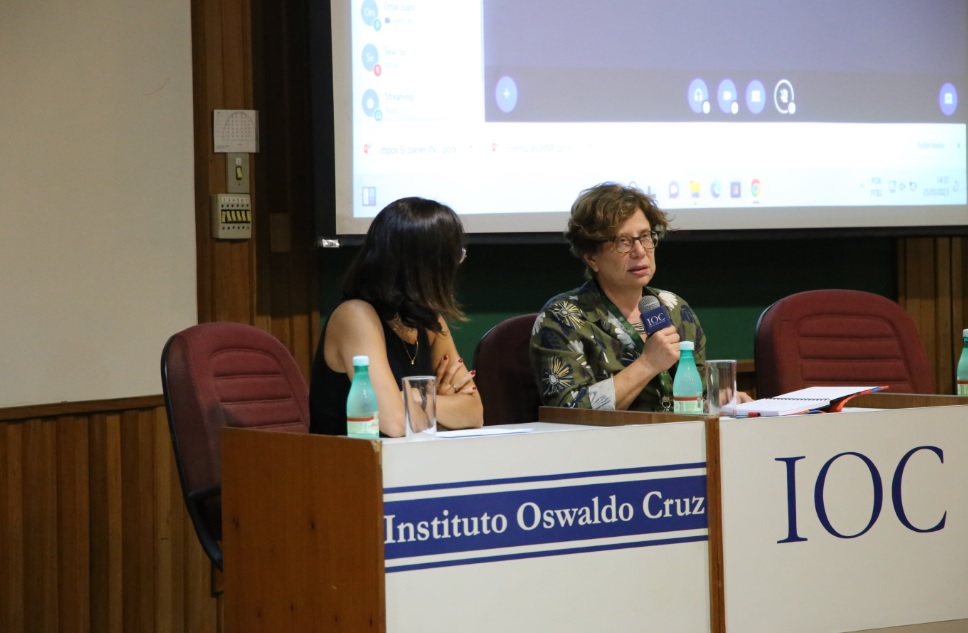INI/Fiocruz and The Lancet Regional Health Americas launch special issue on Mpox
02/02/2023
Bárbara Clara and Alexandre Magno (INI/Fiocruz)
The Evandro Chagas National Institute of Infectious Diseases (INI/Fiocruz) and the scientific journal The Lancet Regional Health – Americas, held last Wednesday (01/25), an event to launch the special edition of the booklet Multinational Mpox in the Americas: Lessons from Brazil and Mexico, with articles on monkeypox.
The group was welcomed by the infectologist and researcher, Beatriz Grinsztejn – head of Lapclin Aids of INI/Fiocruz, and coordinator of the event. INI's director, Valdiléa Veloso, also greeted the participants, thanking everyone for their presence, notably the magazine's editor-in-chief, Taissa Vilas, for launching the booklet at INI's headquarters, and the speakers who attended the event at Oswaldo Cruz Institute's auditorium.
Valdiléa Veloso, INI's director, speaks during the event at IOC's auditorium (photo: Renan Melgaço)
Opening the discussions, Taissa Vilas explained that the journal focuses on comprehending research with direct public health impacts and on topics that are regionally important. "Maybe they don't get global visibility or maybe they don't get space in other high-impact journals, but for that community, it is extremely important."
The Pan American Health Organization (PAHO) regional advisor, Omar Sued, presented an update on mpox in the Americas region. Omar showed the progression of the disease in this region and highlighted the statement of the director general of the World Health Organization (WHO), Tedros Adhanom Ghebreyesus, who classified mpox as a public health outbreak of international concern, recommending that countries take measures to reduce transmission among the population and protect the most vulnerable groups.
The infectologist from INI/Fiocruz, Mayara Secco – who had her master's thesis Ambulatory and hospitalized patients with suspected and confirmed mpox: an observational cohort study from Brazil published by The Lancet Regional Health – brought to the meeting the updated numbers of the disease in Brazil. Currently, the country accumulates 10,711 confirmed cases; and 15 deaths (data updated until 01/24). Mayara explained that in previous decades, mpox was found mostly in the African continent, and that only since 2022, an outbreak of the disease outside endemic areas was identified.
Mayara also talked about the changing symptoms of mpox "it was very advertised at the beginning that the disease presented itself differently than what we knew before, because we were dealing with more severe cases with disseminated skin lesions, and mandatory systemic symptoms, but in 2022, we see a different context, such as the predominance of anogenital lesions, being single lesions sometimes."
She says that the first case confirmed in Rio de Janeiro (and the second in Brazil) was diagnosed at INI/Fiocruz and came from a patient who had made a trip to Europe. He had a single genital lesion and no other systemic signs or symptoms, which would rule out the possibility of mpox, since the patient did not fit the criteria, until then, for case definition. However, because of the epidemiological link, a collection was done and the result was positive. This result has caused the criteria for identifying the disease to be revised and updated.
Clarissa Damaso, head of the Laboratory of Molecular Biology at UFRJ, talked about the change in the name of the disease from monkeypox to mpox. "The concern about name-related stigmatization is genuine." She said that researchers in African countries were angry by the association of increased cases of mpox being, theoretically, related to a 'monkey disease', even though the animal is as much a victim of the virus as we humans are. The researcher pointed out, however, that just changing the name of the disease would not be enough to change this attitude from society. Remember, it has been a centuries-old tradition in Science to name viruses after the animal or place where they were first identified.
Vera Paiva, a professor at USP's Department of Social Psychology, closed the presentations, bringing the theme Lessons from AIDS and COVID-19 that we can't forget: stigmatization and focus on the rights of people affected by Mpox. The researcher also talked about five areas that are important and should not be ignored in a pandemic: (a) the stigma associated with people from more vulnerable segments; (b) structural deficiencies in the health system; (c) messages that are misleading or inaccurate; (d) reliance on foreign vaccines and treatments; (e) the governance crisis in which the fight against the pandemic takes place.
Beatriz Grinsztejn closed the session of presentations by thanking the speakers and then opened the session for questions from the audience.
Watch the full video on the official INI/Fiocruz channel on YouTube.




